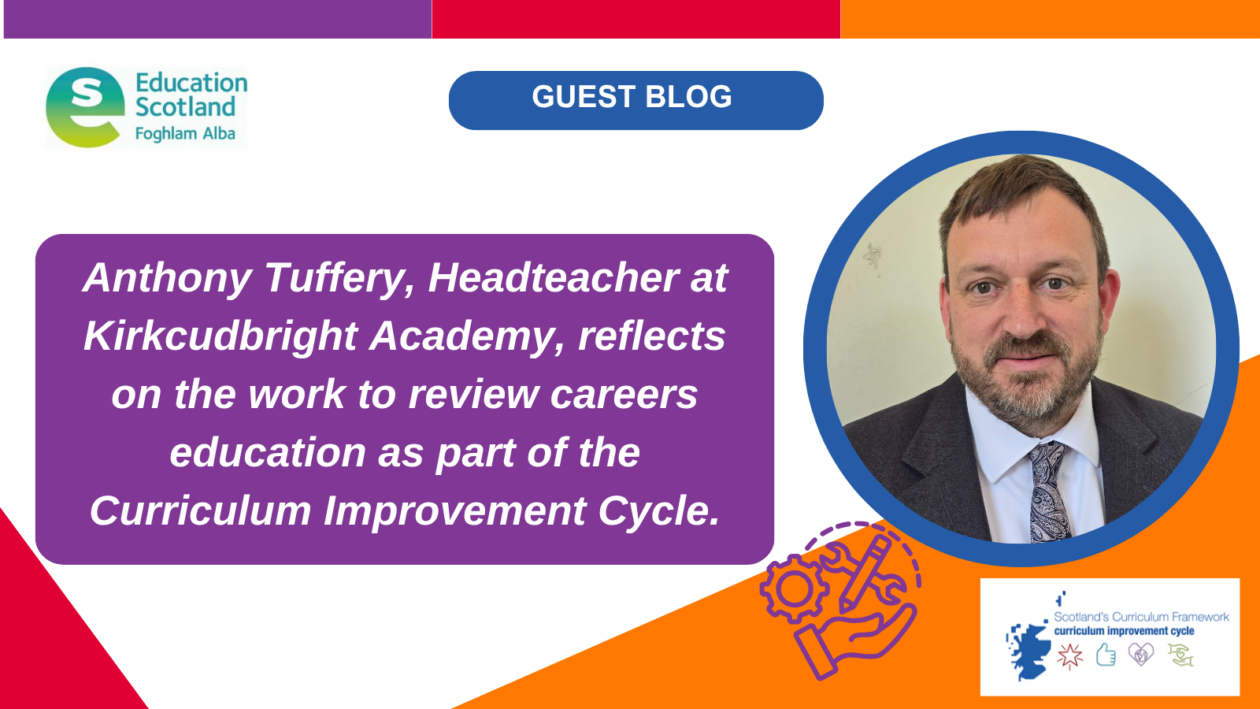
Education Scotland is leading a systematic review of the Scottish curriculum called the Curriculum Improvement Cycle, to ensure it remains up to date and relevant for children and young people. This week we’re focusing on the importance of careers education. In our latest guest blog Anthony Tuffery, Headteacher at Kirkcudbright Academy in Dumfries and Galloway, shares his reflections.
I have been a teacher for 30 years and headteacher for the last dozen of those years; I now feel that my range of experiences has led me to a point where I have a reasonable understanding of the Education System as a whole and the knowledge to potentially help shape the future. My passion for education is undiminished in all that time but I find myself increasingly motivated to be part of the ‘bigger picture’. Throughout my career I have found myself drawn towards the thorny question about the role and place for skills in the curriculum, an integral part of career education. Ranging from subject specific skills, generic skills for learning, life and the workplace, to completely skills focussed curricula with no ‘subjects’. It is against this backdrop that I was excited to be invited to be part of The Curriculum Improvement Cycle (CIC) looking at Careers Education.
As I entered for the first session I approached it with a mixture of excitement, trepidation, a modicum of ‘teacher scepticism’ but above all an open mind – I left with a reawakened passion for my long familiar interest – Skills – and a real feeling of positivity about the process and its place in the broader story of the CIC. That Career Education is hugely important not just in our Education System but across society was immediately apparent from the diversity of people, opinions and professional bodies represented in the room. The enormity of the task was further highlighted when trying to decide what Careers Education entailed, varying from knowledge about what jobs to apply for on leaving school through to developing the skills in young people to be able to participate in a workforce in careers that haven’t yet been invented!
The sessions were well managed, with a design philosophy that allowed much time for exploration and development of ideas but continuously layered outcomes and next steps on top of each other as we advanced through the sessions. For me as a headteacher it was important that the teacher voice was an integral part of the collective of voices from SDS, industry, Further and Higher Education, Youth groups, etc. which heightening the awareness of the importance of participating and gave me a genuine feeling of empowerment and being listened to. I was conscious in the ongoing process that the one voice that was missing was the pupils’ voice, so I was delighted to be able to volunteer my pupils to fill that void – and they were equally delighted to feel that people from Education Scotland wanted to come and visit our little rural school to hear their opinions and that their contributions are valued.
As we approach the end of our bit of the process, I am enormously heartened by the efforts that are being co-ordinated by Education Scotland, through the many strands of the Improvement Cycle, to re-examine and re-focus Scotland’s curriculum for young people now and in the future….although I can only begin to imagine the complexity of the task of bringing together all the CIC strands in a coherent and balanced end product!
If you are keen to hear and learn more about the Curriculum Improvement Cycle (CIC) you might be interested to listen to the Education Scotland Learning Conversations Podcast with Education Scotland Chief Executive, Gillian Hamilton, and Ollie Bray, Strategic Director, on the CIC or read this article from TESS Scotland – CfE review: ‘Evolving Curriculum for Excellence, not ripping it up’. You can also visit the CIC Web Portal / Glow Blog and from here sign up for the termly eNewsletter.

